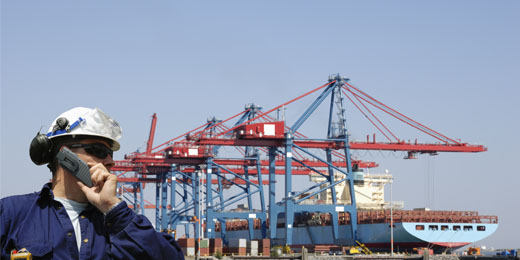The below article titled “Trump’s protectionism will hurt consumers, argue senior economists” was published in Gulf News on 25th Feb 2017, and can be directly accessed here. Comments are highlighted in the article posted below.
Protectionist trade policies are ultimately damaging to the consumers of the country imposing them, according to several senior economists.
The term protectionism refers to the practice of protecting a nation’s domestic industries by taxing imports from foreign competition.
Speaking to Gulf News, multiple economists and analysts expressed their pessimism about the potential benefits of protectionism, a trend that is expected to increase in line with populist political movements in Europe and the US.
“Past practice shows that trade protection is both costly and ineffective. High tariffs translate into higher prices both for consumers and companies. Protectionism disproportionately hurts poorer households who spend a greater share of income on traded goods,” said Gary Hufbauer, Senior Fellow at the Peterson Institute for International Economics, and former deputy assistant secretary for international trade and investment policy of the US Treasury.
The move towards protectionism comes at a time of increasing resentment towards globalisation, and perceived job losses due to offshoring, and the free movement of goods and services.
Donald Trump, president of the United States, has signalled this shift in his ‘America First’ policy, which states his administration’s intent to negotiate trade deals which will return jobs to America from abroad, increase wages, and support US manufacturing, according to the White House website.
Trump has also referred to the “abuse” of trade deals by foreign countries that “hurt American workers,” promising to “crack down” on those nations and “use every tool at the federal government’s disposal to end these abuses.”
Hufbauer believes that rather than increasing prosperity at home, these policies will in fact lead to a harmful cascade effect.
“The twin goals of creating manufacturing jobs and ensuring a level playing field (when foreign countries engage in “unfair” trade practices) have spurred calls for raising US tariffs on imports,” Hufbauer said in an email.
However, he argued, “high tariffs risk provoking tit-for-tat retaliation in the foreign market, which can seriously hurt domestic firms and workers. Meanwhile, the big winners from tariffs are often alternate, third country exporters that end up supplying the same good.”
Regarding Trump’s recent remarks about imposing a 20 per cent import tax on all goods from Mexico, Nasser Saidi, President of Nasser Saidi & Associates, and the former Minister of Economy and Industry in Lebanon, agreed with Hufbauer’s point about third country exporters.
“This would benefit other exporters that produce goods that compete with Mexican goods, and to a more limited extent locally produced, import-competing goods,” he said in an email.
A key risk for the global economy in 2017 is a sharp downturn in trade spurred by protectionist policies, according to analysts at Bank of America Merrill Lynch, with the risk that protectionism could further slow global trade, which has been sluggish since the financial crisis.
In theory, whilst protectionist measures are intended to support domestic industries (even at the expense of consumers), they can often have the opposite effect.
“Import taxes increase the landed cost (the total price of a product once it arrives at a buyer’s door) of goods and lowers the purchasing power of consumers in the economy.
To offset this impact, the local manufacturing base should be able to capitalise on the added competitiveness that an import tax brings and invest and as a result create jobs,” said Saleem Khokhar, Head of Fund Management, National Bank of Abu Dhabi.
Khokar, however, echoed Hufbauer’s statement about tit-for-tat protectionary measures.
“Usually this protectionary approach is met with similar retaliation from trading partners which means that this added competitiveness may not be translated into higher exports,” he said, adding that “sustained protectionism could also cap the growth of businesses beyond the home market.”
This cap on growth could be damaging to the company’s revenue in the long term.
Other negative effects of protectionism are more hidden, but equally as damaging.
Mexico is currently the 3rd largest goods trading partner of the US, with $531 billion in bilateral goods trade during 2015. Goods exports totalled $236 billion; goods imports totalled $295 billion.
“Interestingly, 40 per cent of the parts in a typical Mexican product originate in US, illustrating that Mexico (and other countries such as Canada) are integrated into the US global supply chains, according to the Commerce Department. Hence, around 6 million US jobs depend on trade just with Mexico, according to the US Chamber of Commerce. So, tariffs on Mexican products could actually lead to loss of jobs in the US and hurt the US economy, in addition to the impact on consumers,” Saidi said.
Historically, protectionism has been a costly practice.
In one such case in 2011, US tariffs imposed on Chinese tire imports to protect the US industry likely saved some 1,200 jobs, according to Hufbauer.
“But at the same time, higher tire prices cost American consumers roughly $1 billion in 2011, with the cost per job saved at least $900,000 that year (per estimates by Hufbauer and Lowry, 2012),” he said.
Saidi also cited a specific example: the imposition of tariffs on certain steel products in 2002, lasting for three years.
“It turns out that not only did steel prices go up, but around 200,000 American workers lost their jobs in 2002 (as a result of higher steel prices) than the total number employed by the US Steel industry itself (187,500 Americans were employed by US Steel producers in December 2002). One out of four (50,000) of these job losses occurred in the metal manufacturing, machinery and equipment and transportation equipment and parts sectors,” he said.
It seems the Gulf region isn’t exempt from protectionism, either.
Saudi Arabia has recently increased import tariffs on 193 commodities, Khokar said, adding “a case in point would be higher tariffs on imported poultry, which would benefit Almarai (a local agricultural company), but customers would have to shell out more.”
“For the region, import tariffs are also a way of driving an implicit depreciation of the currency to prevent imported competition due to a strengthening Dollar.”
Comments on US protectionism, Border Tax in Gulf News, 25 Feb 2017
26 February, 2017
read 4 minutes
Read Next
media page
Comments on BRICS+, geo-political fragmentation and the role of the USD in CNN Business Arabia, 17 Jun 2024
Dr. Nasser Saidi’s comments appeared in a CNN Arabia article titled “هل يضعف تدويل
21 June, 2024
media page
Comments on Saudi Arabia’s reduced spending plans in Al Monitor, 16 Jun 2024
Dr. Nasser Saidi’s comments on Saudi Arabia’s reduced spending plans appeared in the article titled
19 June, 2024
media page
Comments on UAE-China economic linkages & prospects in The National, 28 May 2024
Dr. Nasser Saidi’s comments appeared in an article in The National titled “Trade deals and
29 May, 2024





